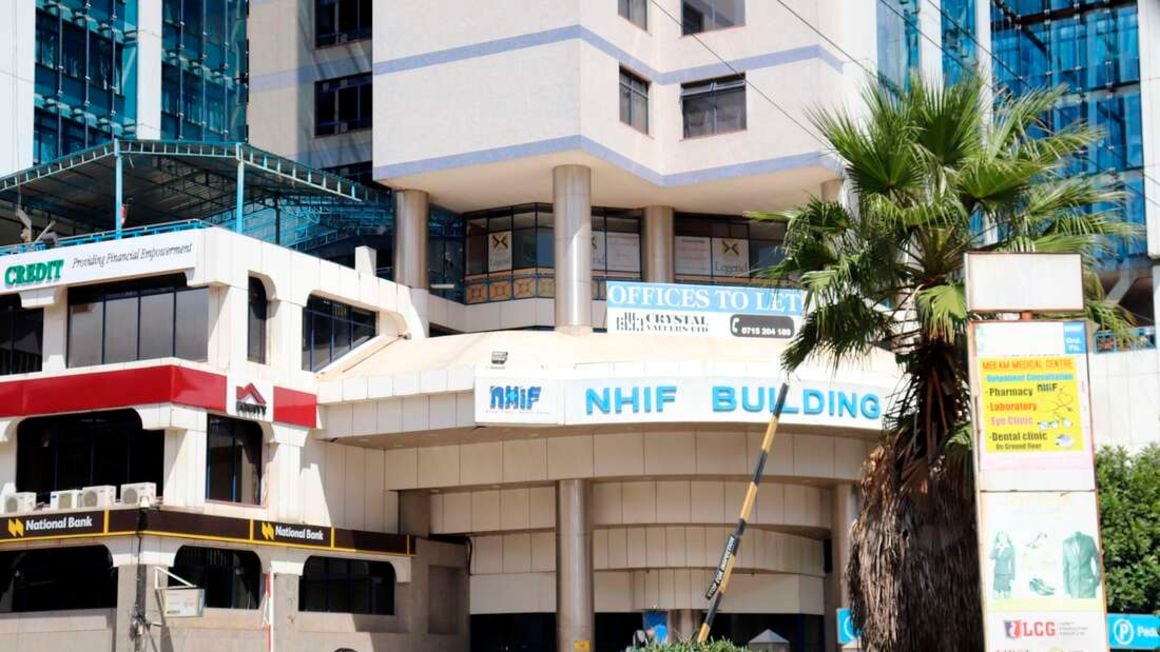
NHIF Building in Upper Hill, Nairobi. FILE PHOTO | NMG
Summary
- The fund has disclosed that 5.7 million members or 54 percent of the 10.6 million members had stopped paying premiums by the end of last month.
- NHIF chief executive Peter Kamunyo said a significant share of the dormant members stopped the monthly contributions after receiving covers worth hundreds of thousands.
More than half of National Hospital Insurance Fund (NHIF) members have stopped paying monthly contributions after the State-backed insurer paid billions of shillings for their treatment, setting the stage for a cash crunch.
The fund has disclosed that 5.7 million members or 54 percent of the 10.6 million members had stopped paying premiums by the end of last month having benefited from NHIF services, including key procedures that come with hefty bills.
NHIF chief executive Peter Kamunyo said a significant share of the dormant members stopped the monthly contributions after receiving covers worth hundreds of thousands.
The mounting defaults is also a reflection of the struggles that households are facing in an economy that has witnessed a string of job losses in recent months across nearly all sectors as firms intensify austerity to protect their profits following effects of Covid-19 pandemic.
Workers in the informal sectors are not required to make compulsory NHIF contributions like their formal-sector counterparts.
“All these people who have ever been members have come in and consumed a service. You have someone for instance who on realising they need a hip replacement, they join NHIF, pay for a couple of months, go to hospital and get their hip replaced and then disappear,” said Mr Kamunyo.
“If we have a continued scenario where it is only the sick who are paying the premiums and disappear once they get full benefit, then the scheme becomes unsustainable.”
The scenario — called adverse selection in insurance terms— is putting at risk the ability of the insurer to settle claims and meet administrative costs.
Adverse selection refers to situations where an insurance company extends coverage to an applicant whose actual risk is substantially higher than the risk known by the insurance company.
The NHIF collected Sh59.5 billion from the 8.998 million members in the year ended June 2020 and paid out Sh54.9 billion or 92.2 percent as claims to hospitals.
Mr Kamunyo says a significant share of active voluntary contributors are suffering from chronic diseases, leaving the fund with huge monthly claims.
Voluntary contributors — usually drawn from informal sector — pay Sh500 a month to the NHIF while those in formal sector contribute between Sh150 and Sh1, 700 every month, depending on salary scale.
The number of voluntary contributors has jumped in recent years on the back of a mass recruitment drive.
The drive was aimed at pushing Kenya towards universal health coverage and protect citizens from out-of-pocket expenses that are a headache to most citizens.
The number of voluntary contributors rose from 1.99 million in 2015 to 4.16 million in 2019. The increase is also the product of increased inpatient and outpatient benefits enabling members to access dialysis, chemotherapy, radiotherapy and theatre services.
The NHIF says that the 5.7 million dormant members have left the Fund in losses, arguing that for every Sh1 collected from the defaulters, it paid bills of Sh2.
"The ones who stay are those on chronic treatment such as dialysis. They pay Sh6,000 for the family and get up to Sh935,000 every year," said Mr Kamunyo.
Mr Kamunyo says the problem of adverse selection will be sorted through the ongoing changes to the law that seek to make it compulsory for every adult Kenyan to be a member of the NHIF in race to offer medical cover for all.
The government-backed NHIF (Amendment) Bill seeks to make it compulsory for every Kenyan above 18 years to contribute and be a member of the Fund.
The review of law, which is currently before Parliament, will target more than 16 million adult Kenyans who are not covered by the NHIF.
The State has offered to sponsor one million poor households at the onset of the Universal Health Coverage (UHC) scheme, which is modelled on the US’s Obamacare that extends insurance to 32 million uninsured Americans.
Obamacare, officially known as the Affordable Care Act, requires all employers to cover their employees or pay a tax penalty, except for small firms.
It, however, offers subsidies to those who cannot afford a plan on their own through tax credits and paying insurance companies to keep their deductibles low.
Due to low insurance penetration, a quarter of all Kenyans’ healthcare bills are paid out-of-pocket, according to the World Bank.
This leaves many families vulnerable and reliant on debt and donations or disposal of assets such as livestock or household goods.




No comments:
Post a Comment